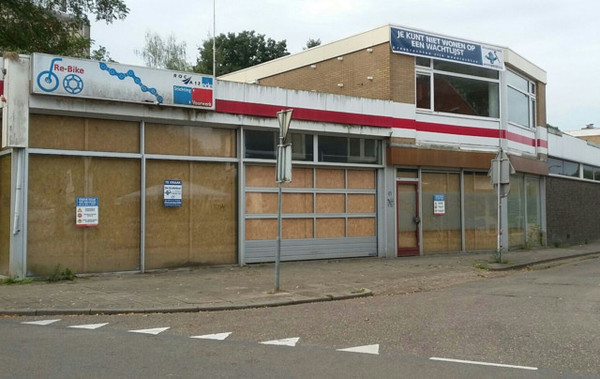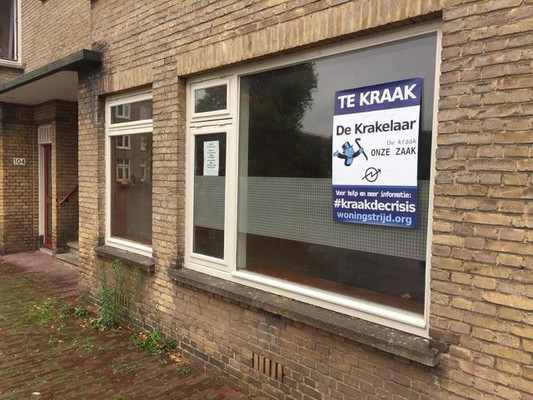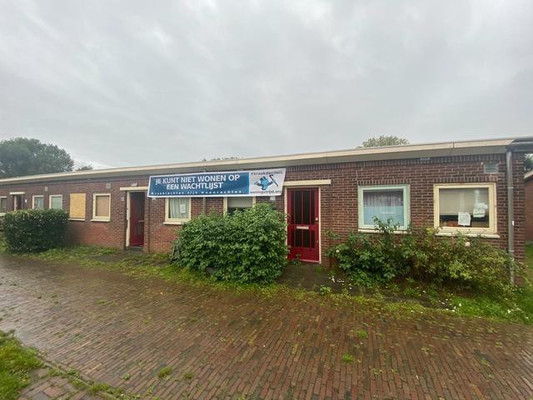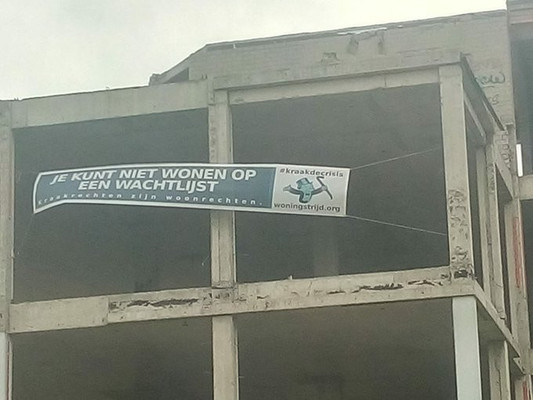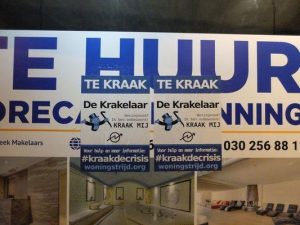 10 Years On! And you still can’t live in a waiting list!
10 Years On! And you still can’t live in a waiting list!
Today, October 1st, 2020 marks the 10 year anniversary of the criminalisation of squatting in the Netherlands through the Kraken en Leegstand (Squatting & Emptiness) law.
Despite the law, kraken gaat door (squatting continues).
On the face of it, the law was created to end both squatting and emptiness. It has done neither. Buildings are still empty and for many people squatting remains a necessity. After all, it is not the existence of empty buildings that leads to squatting, but rather the lack of accessible housing.
Whether you are squatting, renting, or looking to buy a home, finding an available (let alone affordable) house is a struggle.
Waiting lists remain long. While rent and housing prices continue to rise across the country [1].
In 1911, people living in Amsterdam spent 16.2% of their income on housing. In 2015 people were spending 38.9% [2].
And not only do renters spend an average of 40% of their income on housing, but the poorest, most vulnerable people spend the most [3]
In the private rental sector the situation is even worse. Young adults living in the private sector spend 50% of their income on rent [4].
This story is reflected across the country. Since 1996, rents have increased 21% nationally, while wages have risen just 8% [5].
Given the level of extortion occurring in the rental sector (and the fact that squatting was made illegal!) it is unsurprising that homelessness in the Netherlands doubled from 2009-2018 to nearly 40,000 people [6]. And given the new economic conditions brought on by the pandemic, we can only assume this number is rising.
And while 40,000 people struggle through life without a place to live, an estimated 100,000 homes stand empty across the country [7]. And that doesn’t even include the tens of millions of square metres of office space standing empty. Apparently the government forgot to implement the second part of their 2010 law…the part that was supposed to deal with emptiness.
What’s more, emptiness is hidden by anti-squat companies placing ‘vacancy managers’ inside buildings. These companies charge desperate people who have few other options (if any) to accept giving away their housing rights in return for a temporary, extremely precarious place to live.
Anti-squat companies are notorious for leaving buildings almost entirely empty, apart from a couple of lonely ‘vacancy managers’. After all, it only takes one person for them to claim the building is in use and thus prevent it from being squatted. In the Netherlands, a staggering 50,000 people live in this way [8]!
Under such conditions, squatting is a necessity. Legal or not.
 You Can’t Live in a Waiting List
You Can’t Live in a Waiting List
Squatters Rights are Housing Rights
Actions throughout the Netherlands after 10 years of squatting ban
Today, 1st October 2020, is the tenth anniversary of the introduction of the Law on Squatting & Emptiness. Although the aim of this law is to combat vacancy, little seems to have changed after ten years. There are more than 30 million square metres of vacant property in the Netherlands. Half of these are homes: 110,000 houses are empty. In the meantime, there is a lack of 263,000 homes. That is why action is being taken throughout the country to address the current housing shortage and to show that squatting is a legitimate option.
The krakelaar: Your squat, our cause!
Last night in The Hague, Utrecht, Amsterdam, Ede-Wageningen and Groningen posters of the ‘Krakelaar’ were hung on empty buildings. The posters include the text: ‘To squat’, to indicate that the building can be squatted. In addition, banners have been hung at various places in the country that say: ‘Squat the crisis’, ‘You cannot live on a waiting list’ and “Squatters Rights are Housing Rights”.
A direct solution
With this ludic action, squatters and sympathizers try to draw attention on alternative residential spaces, evicted for emptiness for decades. Instead of relying on local, regional or national authorities to tackle the housing shortage, they believe that squatting is still a direct solution, without waiting lists.
In addition, the community is trying to raise issues on anti-squatting. Students and other precarious residents are often offered a contract in which, although the costs are low, housing and tenancy rights are significantly reduced or even taken away.
The squatters movement is still alive
Squatting is still possible in 2020. “We are slowly being driven further and further out of the cities, but the squatting movement is still alive” says one of the activists. The creation of autonomous and creative living and working environments is necessary as long as there is no place elsewhere where social, political and cultural initiatives can develop.
Considering Squatting?
If you’re thinking about squatting, a good place to get information is from your local KSU (Kraak Spreek Uur), aka Squatting Assistance Hour. Here is a list of KSUs in the Netherlands: https://radar.squat.net/en/groups/country/NL/topic/spreekuur-ksu
Some squats in the Netherlands: https://radar.squat.net/en/groups/country/NL/squated/squat
Groups (social center, collective, squat) in the Netherlands: https://radar.squat.net/en/groups/country/NL
Events in the Netherlands: https://radar.squat.net/en/events/country/NL
Sources:
[1] https://nltimes.nl/2020/08/21/netherlands-house-prices-still-rising-74-july
[2] https://nos.nl/artikel/2347206-zorgen-over-hoge-huren-slokt-groot-deel-inkomen-op.html
[3] https://www.nul20.nl/huurders-amsterdam-zijn-ruim-40-procent-van-hun-inkomen-aan-woonlasten-kwijt
[4] https://www.volkskrant.nl/nieuws-achtergrond/stadsgeograaf-cody-hochstenbach-pleit-voor-meer-regie-op-de-woningmarkt-omarm-de-nederlandse-volkshuis-vestelijke-traditie~be7ae710/
[5] https://nos.nl/artikel/2347206-zorgen-over-hoge-huren-slokt-groot-deel-inkomen-op.html
[6] https://www.cbs.nl/nl-nl/nieuws/2019/34/aantal-daklozen-sinds-2009-meer-dan-verdubbeld
[7] https://www.volkskrant.nl/economie/kan-leegstandsbelasting-niet-in-vvd-programma~b88fb25f/
[8] https://zoek.officielebekendmakingen.nl/ah-tk-20192020-1043.html
https://www.cbs.nl/nl-nl/nieuws/2019/48/meeste-oppervlakteleegstand-bij-kantoren-en-winkels
https://www.capitalvalue.nl/nieuws/woningtekort-loopt-op-naar-263-000-woningen
http://woningstrijd.org/
https://www.indymedia.nl/node/48412
De Krakelaar in action, Utrecht, October 1st 2020:
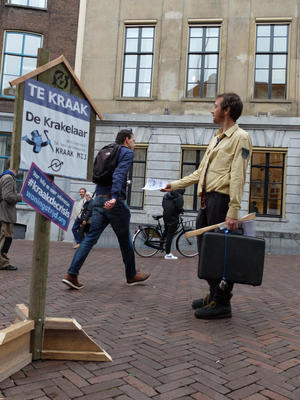
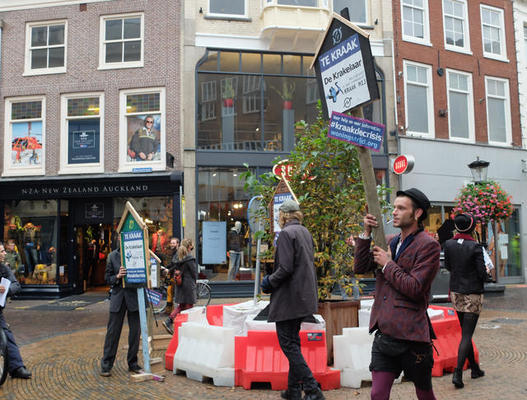
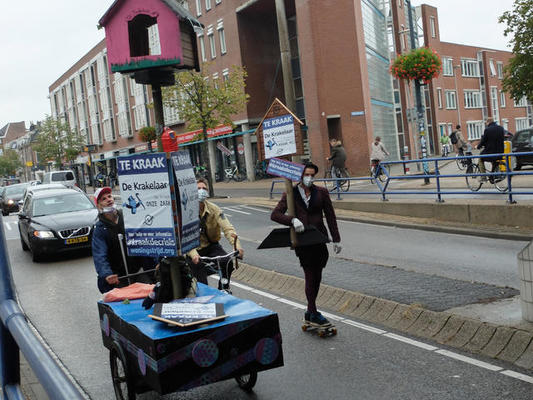
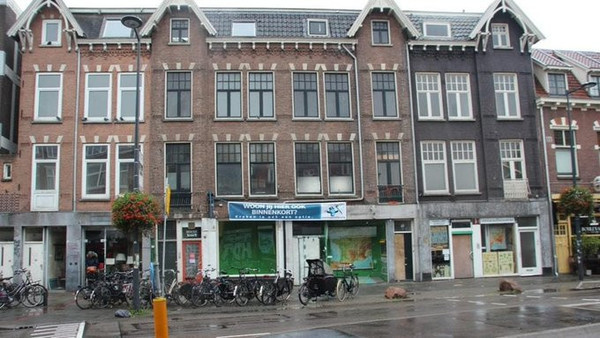 Burgemeester Reigerstraat, Utrecht
Burgemeester Reigerstraat, Utrecht
